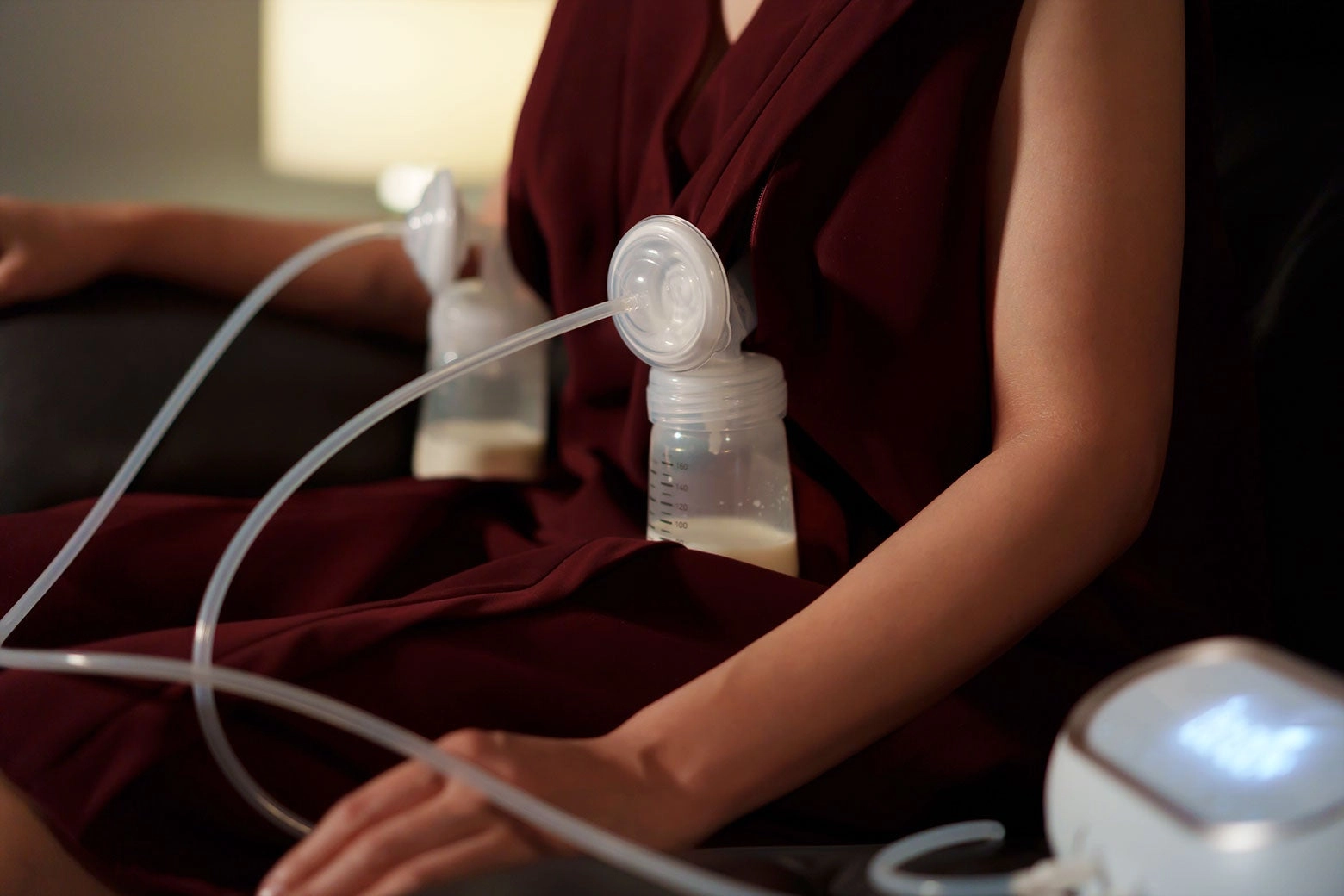Sign up for the Slatest to get the most insightful analysis, criticism, and advice out there, delivered to your inbox daily.
I never really got used to working while a breast pump tugged at my nipples. With cold plastic tubes against my body instead of silken flesh, I found the pump about as sensual as a visit to Quest Diagnostics. An animal part of me winced every time I felt the sharp, sudden jerk of the breast pump and calculated the distance between my body and my daughters. I worked from home while she spent her days up the street in the care of a nanny, along with our neighbors infant daughter. It still felt unnerving to be in the house without her. Staring at my laptop while the pump whined only further removed me from the corporeal experience of breastfeedingremoval which, unsurprisingly, interfered with the physiological process of milkflow. This is not what nature intended, I would think, trying to summon the sensation of my daughters warm, wet mouth and checking to see if milk had sputtered from my tits before the ding of a new message yanked me back to my inbox.
But nature probably also didnt intend for me to spend 45 hours a week apart from my infant child while I billed time to clients in six-minute increments. No one at my law firm had taken maternity leave in a decade. I dont think anyone is asking you to work while you pump, said the one female partner when I returned and asked about blocking out time on my calendar for it. But no one had ever asked me to eat lunch at my desk, either, and I did most days because no one else took a lunch break. Even at our small firm, it was hard to forget the literal timer always running in the background, the software that kept track of the number of hours we billed and our hourly rates, directly translating our worth into revenue. Pumping occupied at least an hour a day, an hour that I couldnt log in the timekeeping software unless I was also billing a client. It was also an hour that I frankly needed in order to tackle my duties in the already compressed parental work day. I didnt even have time to commute to the coworking space I was paying for. And so, twice a day, I put on a pumping bra, squeezed my pump onto a stack of papers on the corner of my desk in the corner of our dining room, and let my breasts cry.
In a study comprised of mostly white, educated, professional, first-time mothers in the Bay Area, Avishai found that an emphasis on making it to the one-year mark without introducing breast milk alternatives & resulted in constant monitoring and assessment of production levels and the stash in the fridge. Women expressed anxiety about uncooperative lactating bodies. To increase milk supply, women turned to supplements, diet modifications, intensified pumping schedules, and stronger pumps. I hadnt gone into breastfeeding with any particular goal, but now I dreaded having to wean my daughter before we were ready. In a panic, I turned to Reddit. R/breastfeeding offered the laughable suggestion that I add a pumping session in the middle of the night, since my daughter had recently started sleeping 12 hours. For a week, I dutifully set an alarm for 3 a.m. before realizing that the desire to forgo formula for as long as possible was not unlike the urge to pace around my living room in the evening until I hit 10,000 stepssomething done in the name of health, but clearly insane. I acceded to giving my daughter a formula bottle.
But I wasnt ready to stop pumping, even though the pump was quickly becoming the loathsome symbol of my separation from my daughter. Pumping sucks, moms will commiserate with each other, though rarely do we specify what we hate about itlugging the equipment, finding the time, keeping the milk cold, the simple reality of stimulating your nipples with a vacuum. What we rarely acknowledge is the lonely thanklessness of the whole ordeal, the performance of additional labor which is at best tolerated by our employers, and at worst, viewed as indulgent.
Returning to work will often mark the end of a womans breastfeeding journey, which is a weird euphemism used on the internet to refer to how long you breastfeed your child. We cheer each other on anyway, as we grimace through meetings that run long and retreat into our windowless supply closets. You got this, mama! we say, only somewhat sarcastically. The slogan of a country that does nothing for mothers.
Meanwhile, the breast pump companies have not missed an opportunity to profit from the stress of the increasingly ubiquitous simultaneous double shift. With less bulky, more discreet pumps coming to market, their innovations promise multitasking with ease. An old-school pumping bra allows you to use your hands while you pump, but not much else. The new generation of wireless wearable pumps, which hit the market in 2017, can be slipped inside a bra, controlled from an app, and used without unseemly flanges and tubing. You can wear them at a lunch or on a Zoom. They are an iPod compared to a boom box. One manufacturer, Elvie, sells its premiere wearable for over $500the technology has improved significantly since 2017and features testimonials from working moms on its Instagram account. Emails, meetings, and yupeven recording a podcast ALL. WHILST. PUMPING, writes one #momboss.
But not even a $500 breast pump can fully eliminate the burden of having a bodymine, for instance, refuses to perform without privacy. Normalizing the expectation that our bodies produce milk while we argue in court or remove wisdom teeth is frightening evidence that for workers in the United States in 2025, not even bodily functions are sacred. After all, we see employers increasingly treating the needs of the body as privileges, as evidenced by Amazons erosion of its workers right to use the bathroom and the cultural death of the white-collar lunch break. I realized using a wearable pump on a Zoom call would feel more like peeing in a bottle in the delivery truck than I was comfortable with.
I dont want to disparage any mother who has felt like a badass while simultaneously expressing milk and slaying at work. Theres no question that this double labor requires incredible focus and commitment. I cant shake the image of a friend who is a neuroradiologist having to pump under her shirt in front of the computer in the same room where she reads scans surrounded by older male colleagues. She got used to it, she told me. I felt awe, but also my own nipples wanting to retract into my body.
 Read More
Read More
In recent years, we have seen a spate of new protections for lactating employees passed at the state and federal level, including a little-known provision of the Affordable Care Act that requires insurance companies to cover breast pumps. Without minimizing the import of this legislation and its public health benefits, lets think about what is valued in a society that offers mothers a pumping room but not the chance to take paid leave in line with every other industrialized nation. (In contrast, many Swedish moms, with their famously lengthy parental leave, never even use a breast pump.) Though we have come a long way, lactation accommodation laws still place the onus on individual employees to negotiate awkwardly with our bosses over the terms of how we will relieve a basic need of our bodies and our childrens. No wonder there is a market for a device that allows us to stealthily pump under a baggy sweater instead!
The one time I tried pumping on a Zoom call, the pump precariously balanced out of frame, I was distracted by the square that contained my own disembodied reflection. Having to hide my bodys extraordinary abilities and resulting needs didnt feel empowering. I fantasized about hanging up, confessing my dirty little secret that feeding my baby mattered more to me than another meandering litigation strategy call. For a moment, I envied the tradwifes freedom from this obligatory compartmentalization, her ability to dreamily whip her tits out of a nap dress whenever she pleased. But as if a passing reverie of domestic bliss could erode 50 years of womens progress in the workplace, I quickly tried to retract the thought. I wanted to work, didnt I? Just not like this.
Becoming a mother wasnt the only reason, but I quit my billable-hour job. Im now my own boss, slowly trying to disentangle my sense of self-worth from my productivity. Im still breastfeeding, which means I still pump when Im away from my daughter for longer stretches, but I only pump at my desk if I want to. Its clear now that the pump is merely an instrument, one that doesnt care why I am away from my daughter. It has given me the choice to keep breastfeeding my daughter, a choice I wouldnt have otherwise had.
I spent most of my daughters first year consumed by the struggle to do it allto keep pace with her appetite and my billable hours, to not break my stride at work even as my stride was undeniably broken. As multitasking failed me, I turned inward, blaming the pump, blaming my body, and blaming my mom brain. I had wanted to be a working mom, but felt like I was failing at both working and feeding my baby. Its only in the months since I left my job that Ive been able to see that the frustrations of pumping obscured the true threat to both my breastfeeding journey and my careerour separation, before either of us was ready.
 Sign up for Slate's evening newsletter.
Sign up for Slate's evening newsletter.





